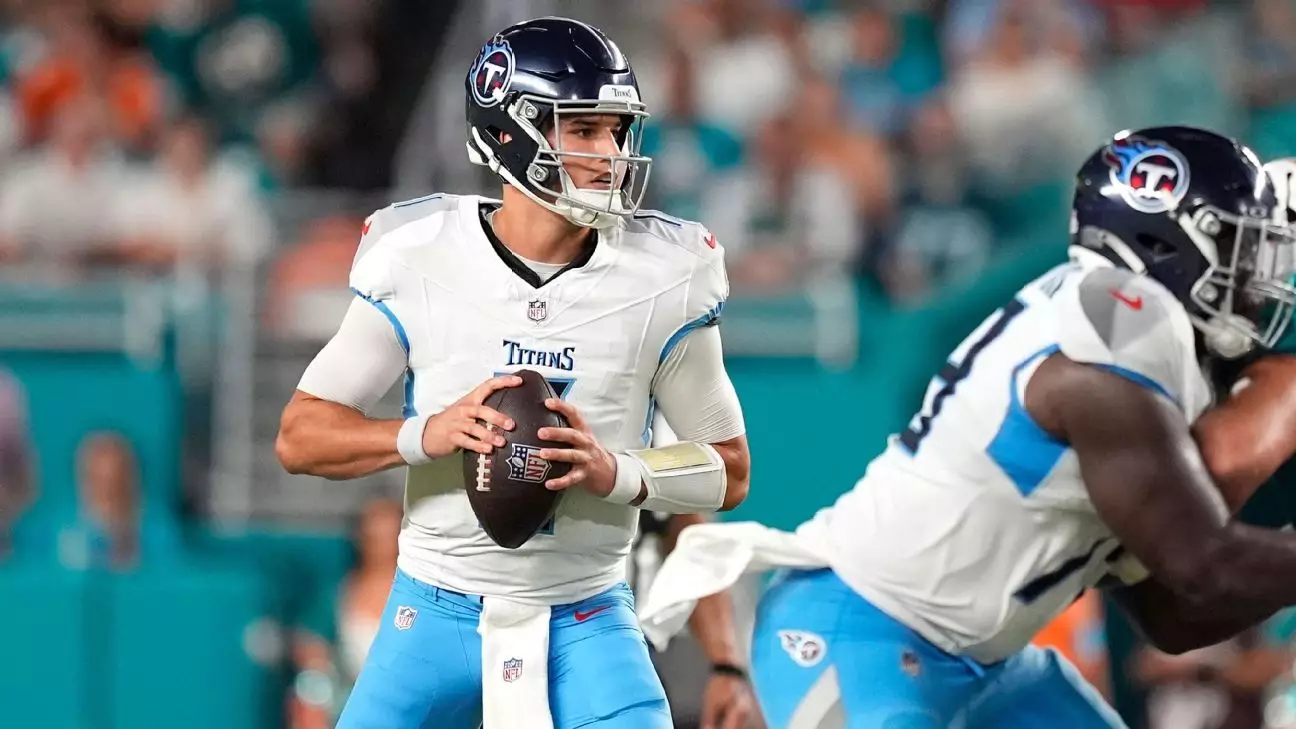Impact of Quarterback Changes on the Titans’ 2023 Season
Hey there, fellow football enthusiast! If you’re anything like me, you know that being a fan of the Tennessee Titans is a rollercoaster of emotions. This season has been no exception, especially with the recent quarterback changes. It’s been a whirlwind, and I want to share some insights on how these shifts might impact the team’s performance moving forward. Let’s dive into the nitty-gritty of what’s happening with our beloved Titans!
I remember watching the game against the Miami Dolphins, holding my breath as Will Levis took a hard hit. It was one of those moments where time seemed to slow down, and every fan could feel the collective gasp across the stadium. When news broke about his Grade 2 AC sprain, it was like a punch to the gut. But as we all know, football is as much about resilience as it is about strategy. Now, with Mason Rudolph stepping up, there’s a new chapter unfolding for our team.
Key Takeaways
- Will Levis is out due to a significant shoulder injury, affecting team dynamics.
- Mason Rudolph’s experience provides hope but brings new challenges.
- The Titans need to adjust their strategy to accommodate roster changes.
The Challenge of Injuries
Injuries are an inevitable part of sports, but when they strike at crucial positions like quarterback, they can completely throw off a team’s rhythm. Will Levis’s injury not only affects his playtime but also significantly impacts the team’s overall strategy. His absence is felt deeply by fans and teammates alike because he was starting to find his groove on the field. The expectation now falls on Mason Rudolph to fill those shoes and lead the Titans during this pivotal time.

Mason Rudolph stepping up as the starting quarterback presents both an opportunity and a challenge. He’s been in high-pressure situations before, which gives him an edge in terms of experience. However, it’s a different ball game when you’re suddenly thrust into leading a team mid-season. His performance against the Dolphins gave us a glimpse of what he can do under pressure, but consistency will be key in maintaining any momentum gained from that victory.
Adapting to New Dynamics
As we all know, football isn’t just about one player; it’s about teamwork and chemistry. With Treylon Burks also out due to injury, the Titans are facing an uphill battle in maintaining their offensive power. Burks has been instrumental in creating opportunities downfield, so his absence means Rudolph needs to build rapport with other receivers quickly. The coaching staff will have their hands full crafting plays that maximize the strengths of whoever is on the field each week.
The decision to elevate Trevor Siemian from the practice squad further illustrates how complex these roster changes can be. It’s all about having contingency plans in place for unexpected developments during games. By preparing Siemian as backup support, the Titans demonstrate proactive thinking that could pay off if more injuries occur or if adjustments are needed based on performance levels throughout upcoming matches.
Mason Rudolph’s Role Moving Forward
For Mason Rudolph, this season is more than just filling in; it’s an audition of sorts for his abilities as a starting quarterback in challenging circumstances. His previous experiences have prepared him for this moment, but now he must prove he can sustain success over multiple games rather than isolated instances. Fans are hopeful yet cautious — it’s all about whether Rudolph can guide us toward consistent wins while Levis recovers.

There’s something special about watching a player seize an opportunity they’ve waited for all season long. As fans cheer from stands or couches at home, there’s always hope that this change might spark new energy within each player on the field too — encouraging better communication among teammates who need trust each other implicitly amidst external pressures like media scrutiny and fan expectations alike during crucial matches ahead.
A Season Defined by Resilience
The Titans’ journey through this season will likely be defined by their ability to adapt quickly amid external pressures and internal challenges like injuries affecting key players such as quarterbacks or receivers alike within ongoing matchups around NFL arenas nationwide week after week without fail until postseason arrives eventually (hopefully). A successful run relies heavily upon maintaining focus despite setbacks encountered along way until then!

As we watch these events unfold with bated breath from afar while cheering passionately alongside others who share our love for this team regardless outcome ultimately achieved together collectively — remember importance resilience plays not only within sports but everyday life too where challenges often arise unexpectedly requiring similar adaptive skills learned through watching favorite athletes overcome adversity daily basis inspiring us continue striving best selves possible even toughest times imaginable faced head-on without hesitation whatsoever no matter what happens next inevitably beyond our control ultimately still determined forge own destinies chosen paths pursue wholeheartedly whatever may come next year beyond current one ends eventually too inevitably someday soon enough eventually someday again anew once more!
Final Thoughts
So here we are, fellow Titans fans — navigating another season filled with highs and lows alike yet remaining hopeful nonetheless despite everything thrown our way recently including unexpected changes quarterback position among others affecting overall dynamics impacting future performances predicted upcoming weeks ahead soon thereafter shortly thereafter following shortly thereafter soon thereafter next few weeks later… You get point: football unpredictable sport requires constant vigilance adaptation survive thrive amidst ever-changing landscape surrounding industry today tomorrow beyond forevermore eternally onwards always forever infinitely ongoing never-ending journey continues onward eternally into eternity beyond end times eternal journey never ceases ever… [CONTINUE FROM HERE]
Tennessee Titans
NFL 2023 season
Quarterback changes
Mason Rudolph


Leave a Reply